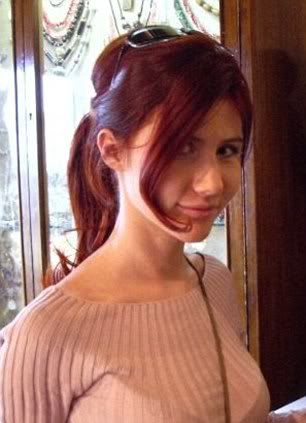
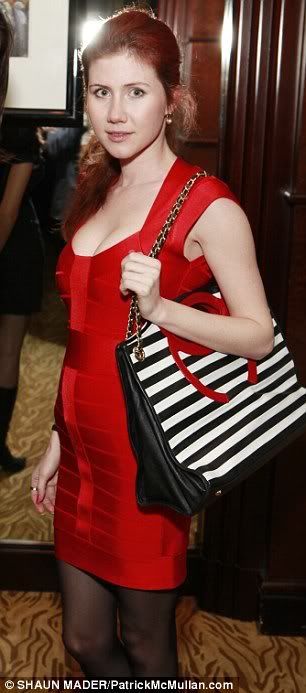
'Highly trained agent': Chapman has also posted some less racy images of herself on her Facebook page.The flame-haired femme fatale: Anna Chapman, dressed in in brilliant red, at a party in New York in March. She is accused of being a Russian spy

The 'practised deceiver': Above left, Chapman in a photo from her Facebook page wearing her signature red dress. Above right, the accused spy in a racy pose also taken from her Facebook page
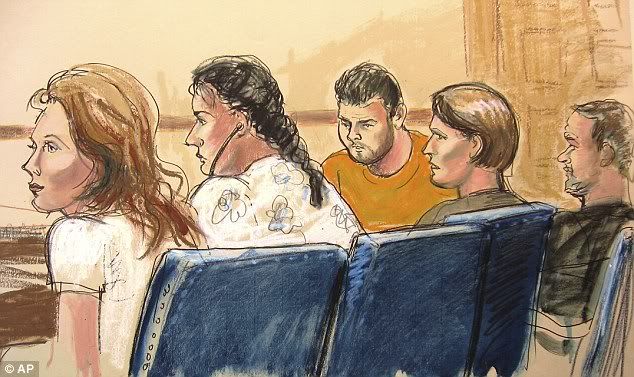
Accused: L-R, Anna Chapman, Vicky Pelaez, the defendant known as 'Richard Murphy', the defendant known as 'Cynthia Murphy', and the defendant known as 'Juan Lazaro' are seen in Manhattan federal court in New York last night
* Foreign Office investigating British passport claims
* Obama refuses to answer questions on arrests
* Putin says he hopes case will not damage U.S.-Russia relationship
* Man believed to be 11th spy nabbed today in Cyprus - then released on bail
* Accused allegedly used invisible ink and steganography
* Eight of the suspects were married couples, some with children
* Plot 'has been in place since the 1990s'
One of the women accused of being a Russian spy in the U.S. travelled on a British passport, according to the FBI.
Tracey Lee Ann Foley, who was posing as a naturalised U.S. citizen born in Canada, is believed to have been given forged British documents by her Russian handlers.
She used them to travel to and from Moscow with greater ease, the FBI has claimed.
The Foreign Office said today it was investigating the claim.
If true, itwill undo some of the work that Prime Minister David Cameron did during the recent G8 and G20 summits to improve relations with Russian president Dmitry Medvedev.
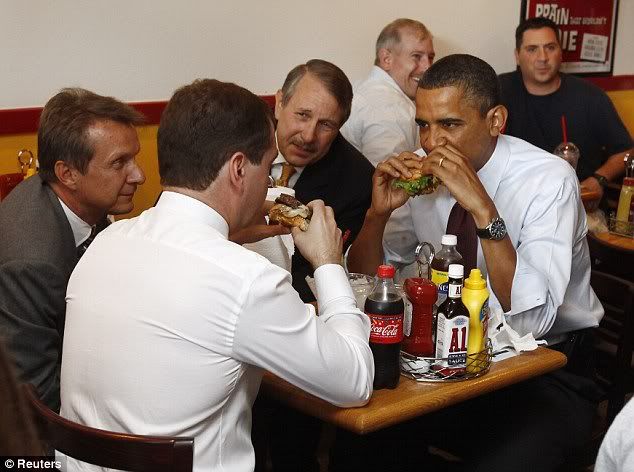
So much for the friendly chats over burgers: Russia's President Dmitry Medvedev and U.S. President Barack Obama in a cordial photo op at Ray's Hell Burger in Arlington, Virginia, last week - before news of the arrests broke

Suburban life: The Montclair, New Jersey house where'Richard Murphy' and 'Cynthia Murphy' were arrested by the FBI on Sunday
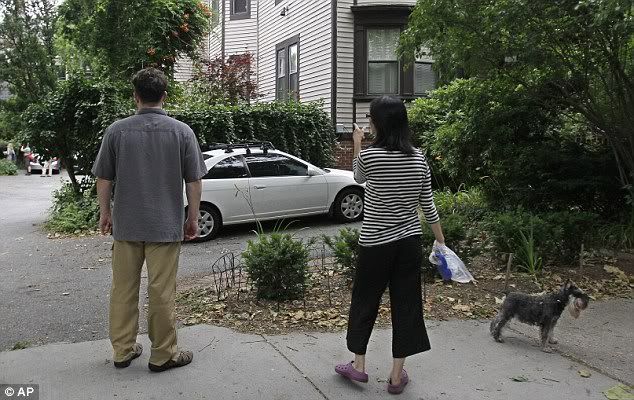
Suburban spies? Neighbours point outside the residence of Donald Howard Heathfield and Tracey Lee Ann Foley in Cambridge, Massachusetts, after their arrest
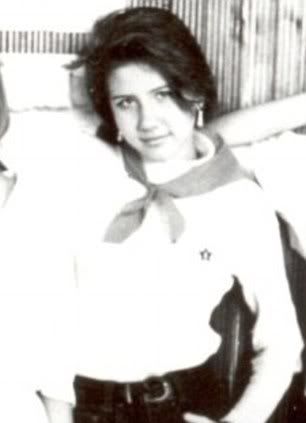


The arrests are already likely to cause huge diplomatic embarrassment and chill relations between Mr Medvedv and U.S. President Barack Obama at a time when they had been thawing.
Today Mr Obama refused to answer questions over the arrests.
Meanwhile Russian premier Vladimir Putin - himself a former KGB hardman - said he hoped the case would not damage recent gains made in U.S.-Russia relations.
Foley is believed to be in her 40s and the mother of two teenage sons.
Her husband Donald Heathfield is also accused of being a Russian agent.
He was posing as a Canadian citizen, living with Foley in Cambridge, Massachusetts, where Harvard University is located.
The pair have lived in the U.S. since 1999.
Foley, Heathfield, and their nine co-accused allegedly used invisible ink, short-wave radios, steganography and wi-fi in cafés to pass coded messages back to Russia - including information on nuclear weapons.
Some of them are believed to have been operating for more than a decade.
One is a red-headed femme fatale named Anna Chapman.
Believed to be a 28-year-old divorcee with a masters' degree in economics and her own online real-estate business, she is being held without bail after prosecutors called her a 'highly trained agent' and a 'practised deceiver'.
Chapman is believed to have used her high-profile connections to pass American secrets on to a Russian government official every Wednesday since January.
On Saturday, an undercover FBI agent posing as a Russian agent met with Chapman at a restaurant in New York.
The agent was pretending to send the alleged spy on a mission to deliver a fake passport to another female agent, according to court documents.
'Are you ready for this step?' he asked.
'S*** yes,' was her emphatic reply.
She was told that her fellow spy would greet her by asking: 'Haven't we met in California last summer?'
Chapman - who agents believe was operating under her real name - was supposed to reply: 'No, I think it was in the Hamptons.'
Once she had handed over the passport, she was to plant a stamp on a wall map to let her handlers know she had succeeded.
But the exchange never took place. The FBI court documents do not explain why.
One of her co-accused, Mikhail Semenko, was similarly set up in Washington by the FBI on the same day.
Unlike Chapman, he did follow through with his delivery.
The FBI also watched Chapman as she sat in a coffee shop in New York and used her lap top to, they claim, communicated with a Russian agent hiding in a mini-van nearby.
And she was once observed going into a Verizon mobile phone shop in Brooklyn to buy a phone using the name 'Irine Kutsov' - giving her address as '99 Fake Street'.
She intended to use the phone for her spying activities, the FBI claimed.
Chapman's lawyer Robert Baum argued that the allegations were exaggerated.
'This is not a case that raises issues of security of the United States,' he said.
The alleged spies have been charged with acting as unregistered agents of a foreign government and with money laundering.
Ten were arrested in the U.S. yesterday and charged in American courts. An 11th man had been on the run - but was arrested by police in Cyprus this morning.
However he was released on bail. Police have not yet explained why.
Among the accused were four couples, including Foley and Heathfield, living quietly in the suburbs of New York and Washington and Boston.
They are believed to have married as part of their cover.
One of the married women, believed to be working under her real name, is Vicky Pelaez, a Peruvian born reporter and editor.
She worked for several years for El Diario/La Prensa, one of the country's best-known Spanish-language newspapers.
She is best known for her opinion columns, which often criticize the U.S. government.
Her son, Waldo Mariscal, told the court that his mother was innocent.
'This is a farce,' he said. 'We don't know the other people.'
In January 2000, Pelaez was videotaped meeting with a Russian government official at a public park in Peru, where she received a bag from the official, according to one complaint.
Pelaez and her husband Juan Lazaro discussed plans to pass covert messages with invisible ink to Russian officials during another trip Pelaez took to South America, the court documents also claim.
The FBI said it intercepted a message from Moscow Center, headquarters of Russia's intelligence service, the SVR, to some of the defendants describing their main mission as 'to search and develop ties in policy-making circles in U.S.'
Intercepted messages showed they were asked to learn about a wide range of topics, including nuclear weapons, U.S. arms control positions, Iran, White House rumours, CIA leadership turnover, the last presidential election, Congress and the political parties.
Court papers also described a new high-tech spy-to-spy communications system used by the defendants: short-range wireless communications between laptop computers.
Working on laptops from free public wi-fi, the spies carried out the modern supplement for the old-style dead drop in a remote area, or high-speed burst radio transmission or the hollowed-out nickels used by Cold War-era Russian spies to conceal and deliver microfilm.
But, despite the new technology, there was no lack of Cold War spycraft.
According to the court papers, the alleged agents used invisible ink, stayed in touch with Moscow Center through coded bursts of data sent by a radio transmitter, used innocent-looking 'brush' encounters to pass messages in public, hid encrypted data in public images and relied on fake identities and false travel documents.
The arrests are already likely to cause huge diplomatic embarrassment and chill relations between Mr Medvedv and U.S. President Barack Obama at a time when they had been thawing.
The two leaders met last week at the White House, and also both attended the G8 and G20 meetings over the weekend in Canada.
Russia's embassy said it was unaware of the arrests and is seeking more information. The Russian Foreign Minister Sergey Lavrov has said he will seek an explanation from the U.S. on the allegations.
'They haven't explained to us what this is about,' Lavrov said at a news conference during a visit to Jerusalem today.
'I hope they will.
'The only thing I can say today is that the moment for doing that has been chosen with special elegance.'
Many Americans have refused to believe that Russia has changed from the lawless days when the country was run by Russia's spying agency, the KGB.
Their fears have been compounded because former President and now Prime Minister Vladimir Putin, a former First Chief Directorate of the KGB, still effectively controls the country, despite stepping down from power in 2008.
Intelligence on Mr Obama's foreign policy, particularly toward Russia, appears to have been a top priority by the alleged spy ring.
The plot appears to have been going on since some point in the 1990s.
Most of those arrested had been living under assumed names, according to the U.S. Department of Justice.
The defendants appeared in court last night.
Should they be convicted of being an agent of a foreign government, they face up to five years in jail, and up to 20 for the money laundering.
The spies' mission was spelled out in one communication sent to two of the defendants: 'Your education, bank accounts, car, house etc. - all these serve one goal: fullfil your main mission, i.e to search and develop ties in policymaking circles in US and send intels' to the Moscow Centre', the Kremlin's spy HQ.
Anna Chapman was of particular interest - and not just for her reputation as a beauty.
She is believed to have entered the Russian Mission to the United Nations on ten occasions and sent messages to agents via a private wi-fi network.
On other occasions she would sit outside a coffee shop or go inside a book store whilst a van with a Russian agent in it parked up nearby, allowing them to share the same wi-fi.
In a series of 'info tasks', Russia is said to have given the spies assignments.
In one for May and June, they had to 'gather information with regard to the use of the Internet by terrorists, United States policies in Central Asia and Western estimation of Russian foreign policy'.
In spring 2009, the documents say, alleged conspirators, Richard and Cynthia Murphy, who lived in New Jersey, were asked for information about Mr Obama's impending trip to Russia that summer.
They were also asked for the U.S. negotiating position on the START nuclear arms reduction treaty as well as Afghanistan and the approach Washington would take in dealing with Iran's suspect nuclear program.
They were also asked to send background on U.S. officials travelling with Mr Obama or involved in foreign policy.
'Try to outline their views and most important Obama's goals (sic) which he expects to achieve during summit in July and how does his team plan to do it (arguments, provisions, means of persuasion to 'lure' (Russia) into cooperation in U.S. interests,' Moscow asked.
Moscow wanted reports 'which should reflect approaches and ideas of' four sub-Cabinet U.S. foreign policy officials.
One intercepted message said Cynthia Murphy, 'had several work-related personal meetings with' a man the court papers describe as a prominent New York-based financier active in politics.
In response, Moscow Center described the man as a very interesting target and urged the defendants to 'try to build up little by little relations. ...
'Maybe he can provide' Murphy 'with remarks re US foreign policy, 'roumors' about White house internal 'kitchen,' invite her to venues (to major political party HQ in NYC, for instance. ... In short, consider carefully all options in regard' to the financier.
The papers allege the defendants' spying has been going on for years.
One defendant in Massachusetts made contact in 2004 with an unidentified man who worked at a U.S. government research facility.
'He works on issues of strategic planning related to nuclear weapon development,' the defendant's intelligence report said.
The defendant 'had conversations with him about research programs on small yield high penetration nuclear warheads recently authorized by U.S. Congress (nuclear 'bunker-buster' warheads),' according to the report.
One message back to Moscow from the defendants focused on turnover at the top level of the CIA and the 2008 U.S. presidential election.
The information was described as having been received in private conversation with, among others, a former legislative counsel for Congress.
The court papers deleted the name of the counsel.
In the papers, FBI agents said the defendants communicated with alleged Russian agents using mobile wireless transmissions between laptop computers - a new spying method.
They established a short-range wireless network between laptop computers of the agents and sent encrypted messages between the computers while they were close to each other.

Real Proven Paid Pay Per click.Earn while surfing.No joke.
















0 comments:
Post a Comment